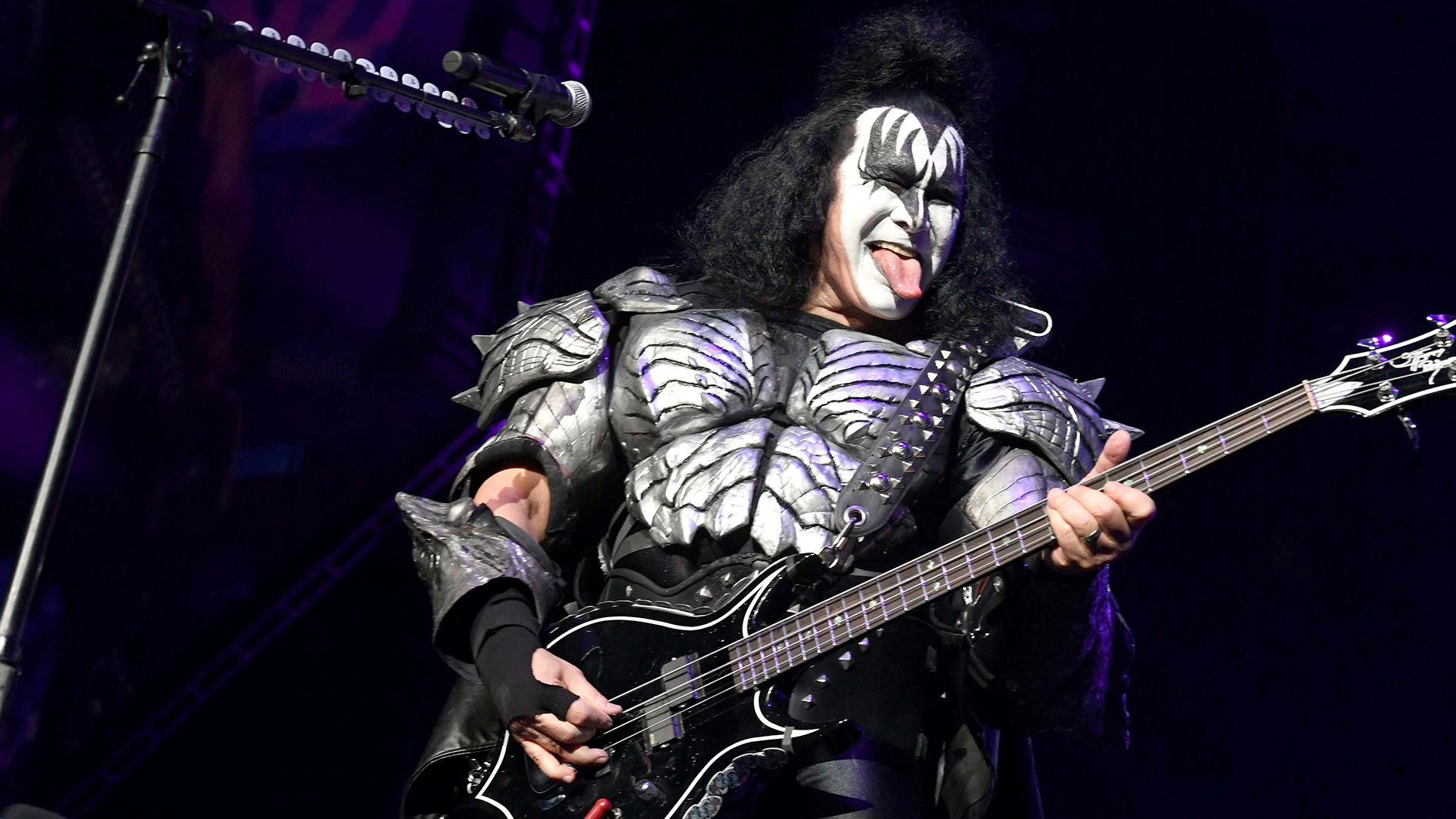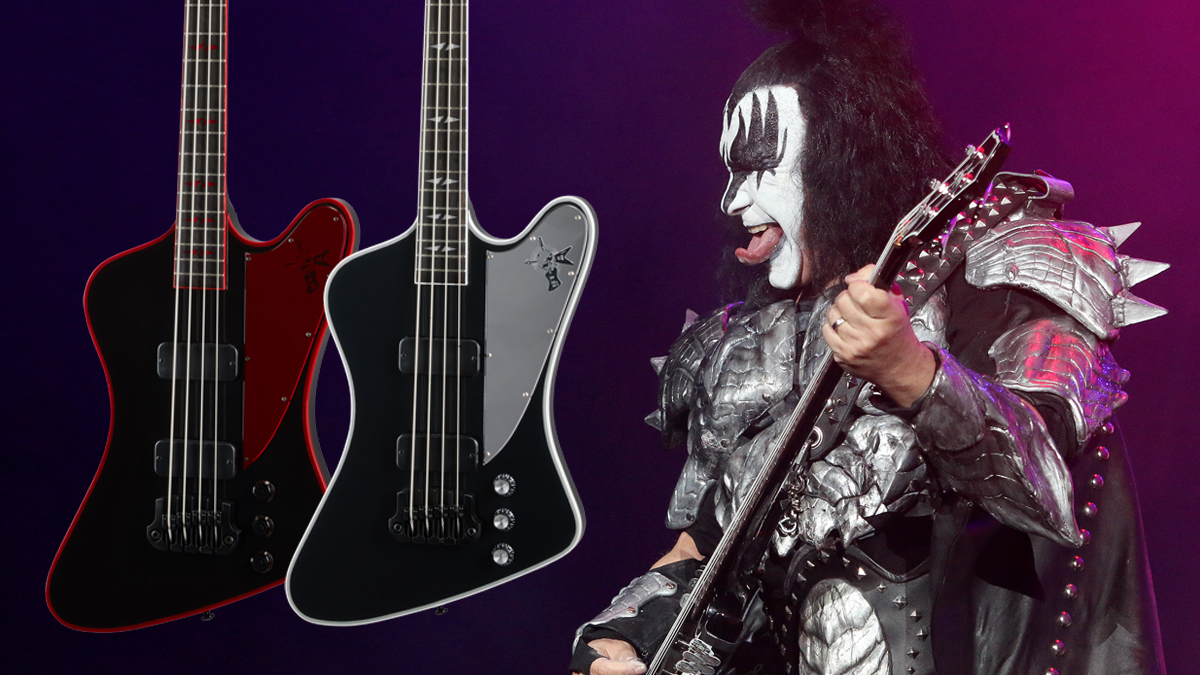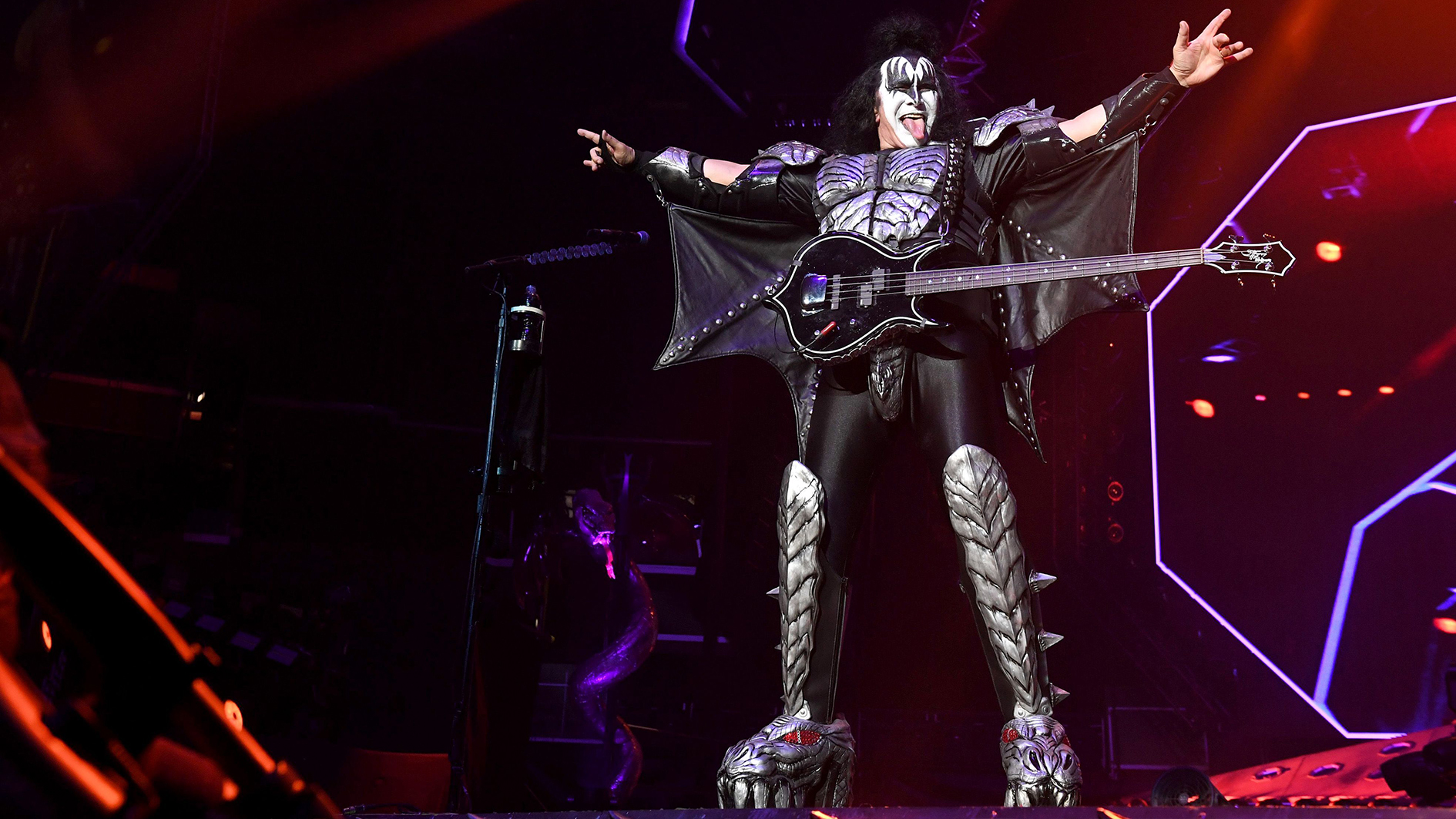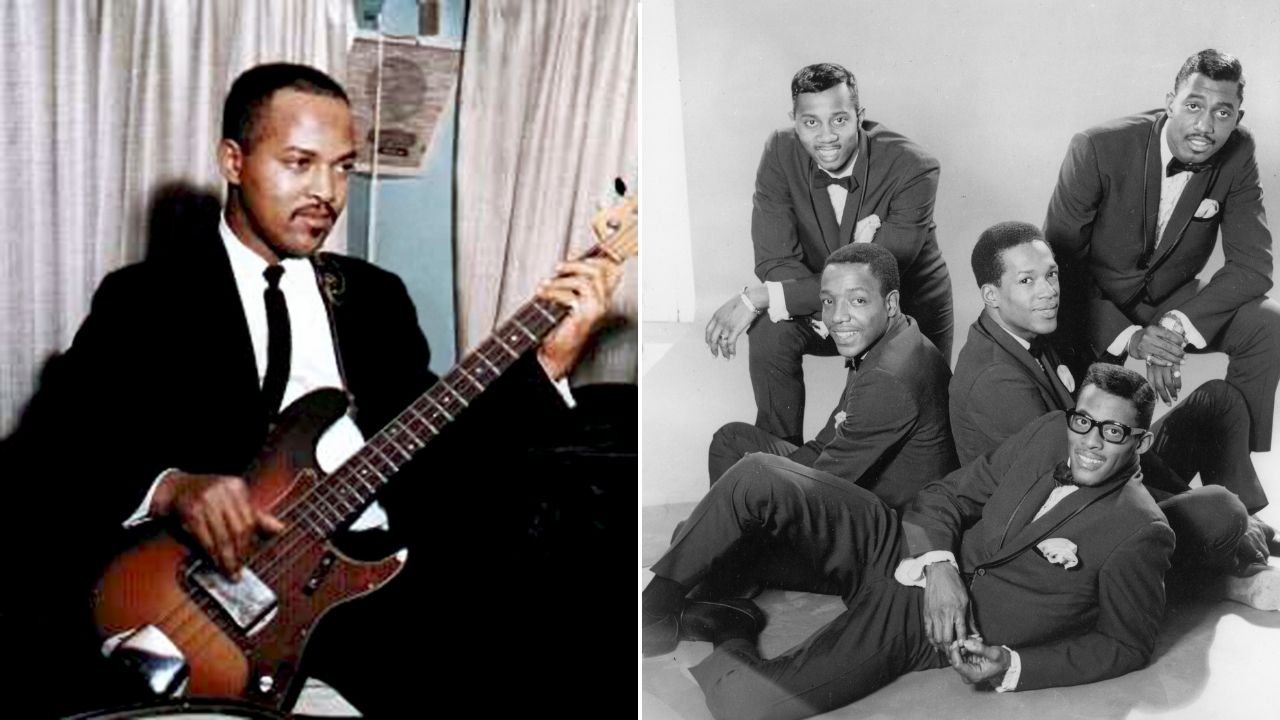Gene Simmons: “People remember a classic and simple bassline more than they do the actual song”
The outspoken Kiss four-stringer on his new line of Gibson G² guitars and basses, the infectious energy of Eddie Van Halen and his favorite basslines of all time

“Yeah, it’s a bit of alwight, know what I mean,” grins Gene Simmons, mocking this Guitar World correspondent’s London accent. The Kiss bassist and singer, known to millions around the world as The Demon or The God Of Thunder, is clearly on good form today.
When asked if he’s ‘mugging us off’ – another term for ‘taking the piss’ – he drops the cockney to jokingly explain, “We don’t know what mugging means out here in the colonies but I have been for my morning pee.”
Our video call with the Kiss legend has only just begun and the tears are already falling. He’s currently promoting his new partnership with Gibson for a signature line of basses and guitars under the name G². So, just to check, that’s G squared right?
“Yes, it’s G squared,” he nods. “In the '70s – and I mean the 1870s before any of you were born – I had used some Gibson basses. The Grabber, the Ripper and so on. I loved the sound but they were a bit cumbersome for me because I moved and ran around on stage a lot.
“I was doing jumps before Ozzy [shocked face]. I love the guy, don’t misunderstand me. So even though I switched basses, I always loved the Gibson sound…”

The recently announced collaboration was partly down to a change of personnel at Gibson, now headed by CEO James ‘JC’ Curleigh and CMO Cesar Gueikian, who have been striving to reinvigorate the great legacy with new artist models and media exclusives. It turns out the founding Kiss member’s name was high up the wish list for partnerships – so much so, he got given his own offshoot brand...
“Over the years, every once in a while, I’d keep in touch with the Gibson people,” continues Simmons. “What are you going to do, a classy outfit is a classy outfit. And it changed hands, there was a new CMO whose name is Cesar Gueikian that had come on board. He’s a very forward-thinking guy who wants to not just rest on the past...”
All the latest guitar news, interviews, lessons, reviews, deals and more, direct to your inbox!
He stops mid-flow and brings his eye close to the screen.
“Oh, I see you have a sunburst Les Paul behind you. I like your black Custom too because it’s Paul Stanley-ish but I really like the Jimmy Page-ish one. By the way, when you do the horns with the thumb outstretched, it actually means ‘I love you’ in sign language…
“Anyways, where was I, Cesar actually reached out to me. He’d heard about my Axe and Punisher, which I’d designed, built and sold myself with no guitar company involved or anything. It was direct to the fans with no stores whatsoever.
There will be a Flying V version that Cesar and I are already working on, plus a guitar/bass double-neck. There will also be left-handed versions for all those people who worship Satan
“He said he wanted to do something and I told him, ‘Let’s not throw the baby out of the bathwater! If we were going to do this together, I want to keep a classic Gibson without changing the DNA.’
“So we’re keeping classic Gibson parts, making it sound better and look better adding a few bits and pieces here and there, but you’ll definitely know it’s a Gibson instrument.”
The first release will be the ebony G² Thunderbird bass, one with silver appointments and the other with red. They certainly looked built to rock…
“It’s those little bits of business that I like. There’s also a logo that’s a skull and crossbones with guitars, and the skull with its tongue out. I added little things like that so it doesn’t look too garish or in your face.
“There’s not a lot of words on there, no big logo, it’s just a classy instrument. Most importantly, the wood is solid, it sounds great like a good kick in the nuts… it’s about as much fun as you’ll have with your pants on!
“Having said that, there will be a Flying V version that Cesar and I are already working on, plus a guitar/bass double-neck. There will also be left-handed versions for all those people who worship Satan.
“We’re still working on the pickups, trying out Gibsons, EMGs, other humbuckers, we’re still playing around with it all. It’s only going to get better and better.”


You took the G² Thunderbird out for a test drive at the New Year’s Eve concert in Dubai. What do you remember about that night?
“Yes, we played out there and went into the Guinness Book Of Records – not just any beer drinker’s hall of fame, which was really quite something. And it sounded really good, boomy in a way that hits you in the chest, which is exactly what basses are supposed to do.
“That night felt like a lapse of reality. It was unlike anything we’d ever done. There weren’t a lot of people there, because of the pandemic, but at the same time we were being streamed to – oh, I don’t know – hundreds of millions of people around the world. It was quite special…
“I just want to say that your girlfriend or boyfriend has been lying to you all these years, size does count! Our stage was 10 stories tall, it was by far the largest one we’d ever played. We had more pyro than most third-world countries, and I’m not saying that to be flippant.
“It was so hot on stage. Those fireballs went up 100 feet, completely surrounding us. The very few people that were there were screaming, they got scared [laughs]! We had fun and, most importantly, we were safe.”
We saw Tech 21 has reposted some pictures of you using their amps at the Dubai rehearsals… can you tell us more about your signal path for the shows?
“No! I will let them wax poetic and prolific. No free rides here. Sorry, are you talking about my tongue or my tone [laughs]?! People that aren’t in bands can be a bit delusional. At home, you have your amplifier and tone knobs, you can always get your sound just right.
I just want to say that your girlfriend or boyfriend has been lying to you all these years, size does count! Our stage was 10 stories tall, it was by far the largest one we’d ever played
“But the variables are much more complex when you play live. You can be in front of your amp with a killer instrument in your hands – we’ll be doing guitars as well by the way, Thunderbirds, Flying Vs and so on.
“Anyways, you can get your tone just right on stage. Then you have an electronic direct to the mixing boards to accompany the microphone in front of the cabinet. But the tonality changes once it goes out to the mixing board and sound system. The way you’ve got your sound, no matter how good, that’s not how it will sound out in the house.”
So what do you end up with?
“What you end up with is something in between that clear direct and the chest-thumping fuzzy sound. That’s why your mixer is really important. You don't want him or her to usurp and bastardize what you’ve got.
“Oh, I forgot to mention… we play live! What you get is real. If I pick it, you hear it, simple as that. Nikki Sixx is not backstage trying to play my bass parts, nothing like that. And good luck to him, and best wishes, by the way.”

We’ll let him know. You’ve written some truly timeless basslines over the years… so what exactly is the Gene Simmons guide to finding the perfect part?
“Well, that is very kind of you to say. My reference points were people like Paul McCartney. Ron Wood is very under-appreciated. He’s a better bass player than he is a guitar player.
“For anyone wanting to get better, I’d recommend picking up the first two Jeff Beck records – which in my estimation kills anything that Zeppelin and other folks put out in the same period. So much of it was live and came from jamming in the studio.
“What Ron Wood was doing was actually more advanced than the music he was playing over, with more pushes and pulls and overall motion. It gives everything a sexy feel, with nice movement on the bottom.
“By the way, there’s nothing wrong with what AC/DC do – pounding along and plugging in with the drums to make a nice railroad track. But unless you have a killer singer and guitar player on top, that song’s not going to go anywhere. Anyway, my point is that there are a lot of different ways of finding the right line.”
Are there any others that come to mind?
“I always liked Felix Pappalardi from Mountain, his bass playing was great. It’s an approach that’s unlike Motown [hums riff]. In fact, the Kiss song Love Her All I Can is one of my homages to Motown… you can hear it in how my bass works against Paul’s chords.
“I like to use a pick because, especially live, you just can’t hear the notes as well when playing fingerstyle. It’s more muffled. So that’s my tirade… and I don’t want to get too tirade doing it, see what I did there?!”
Top-notch banter! Okay, as you’re in such a good mood, here’s another hard question. What’s the greatest bassline of all time?
“Oh my god [takes big sip of his drink]. That’s bubbly water by the way, not alcohol. I don’t drink, never have. Greatest bassline of all-time? Oh goodness.
“Well, when a bassline becomes the song, you’re the king. Jack Bruce actually came up with it, and it might not be the best song necessarily, but as soon as you hear Sunshine Of Your Love, you know that’s the song, that’s the riff and that’s the hook.
“You know it as soon as the song starts. It’s probably the most classic bassline of all-time for me. There’s no movement. There’s nothing fancy. But the bassline is the song. It never veers to a bridge or a chorus.
“A bit like Hit The Road Jack, with that descending line. Once it starts, it never stops or changes. When you come up with things that are classic and simple, things that are immediately memorable, you’ll never forget them. To the point where you remember the bassline more than the actual song.”
You’ve also spoken a lot about your love for Carol Kaye’s playing in the past…
“I’m a big fan of Carol Kaye too. A long time ago she was the short, blonde Jewish lady who played on a lot of Motown records. Everyone thought all the musicians on Motown records were African-American, they were not!
When you come up with things that classic and simple, things that are immediately memorable, you’ll never forget them. To the point where you remember the bassline more than the actual song
“Of course you had James Jamerson, but Carol played on Bernadette, 7 Rooms Of Gloom and all that Four Tops stuff. She played guitar as well as bass, but played bass for Frank Sinatra, Nat King Cole and Sonny And Cher (my old girlfriend!).
“You hear it right from the beginning of The Beat Goes, before the lyrics or anything else it’s the bass that’s the hook. That’s what you remember.
“Those are my favorite things: when the bass doesn’t try to show off, it just does something that’s undeniable and classic forever. Just like when Blackmore came up with Smoke On The Water on guitar.
“As soon as you hear that, you say ‘I’m in!’ You don’t need to hear more than that to want to keep on listening. Of course the bass part for that song is a little busier [hums Roger Glover part]. I probably wouldn’t have done that, I would have done something different like [hums his own idea].”
And as for your own basslines, which is the one you are most proud of?
“Deuce! I’ve written lots of songs, some on bass and some on guitar – because that’s what I started out on – though I don’t play very well. I still do my own demoes, performing the guitar, drums, bass and everything. I did that with songs like Watchin' You, as well as some of Paul’s songs – one’s which sounded good but needed a riff.”
“My riffs are closer to horn lines [hums horn part]. They aren’t trapped with the drums, they work more like a cello does in a string quartet, with its own flow that doesn’t get in the way of the beat.
“And it’s not just one note either… though we’ve done those kinds of songs too, like Lick It Up [hums single note repeating]. Which is what Foreigner did on Hot Blooded… that’s a classic.
“By and large, I won’t do that. So if you hear Paul playing chords like he does on I Was Made For Lovin’ You, I will play something like my bass part on that song [hums opening octave bass riff]. That gives the song steam.
“Back to Deuce though, I wrote it before the band got started. Keith Richards wrote this song called Bitch, which had this flat third against the root – a C against an A. And I took that idea and did my own sort of take on it… so there you have it. Deuce was totally inspired by Bitch by the Stones.”
As you say, there are many different sides to The Demon. Music From “The Elder”, for example, could be the biggest curveball of them all when it comes to the Kiss discography…
“It was a time of flux. A lot of bands were trying to figure out who they were and so were we. Sometimes if you do the same thing forever, you think, like that Peggy Lee song, ‘Is that all there is?’ We did try to fool around on some tracks like [Destroyer song] Great Expectations [sings chorus in falsetto].
The early '80s was a time of flux. People couldn’t figure out what was going on. It was before the hair bands came in – it was a movement where the guys in the bands looked sexier than their girlfriends
“I wrote that song about the band, about someone watching Paul playing guitar, seeing what his hands can do and wishing they were the one he was doing it to… it’s about a groupie! Seeing someone on stage and having great expectations about fooling around with them.
“That was the original song idea and then [producer] Bob Ezrin changed the lyrics a little and made it feel a bit more grandiose. And to be honest with you… I forgot your fucking question!”
Music From “The Elder” – brilliant as it is, it’s quite an odd album, wouldn’t you say…
“Ah yes. Every once in a while, we would try a little off the beaten track kind of thing. I Was Made For Lovin’ You was really an experiment. We were not a dance band, but obviously it worked well around the world. We didn’t go back to that because we’d heard it.
“Every once in a while we’d stick out a ballad like Beth. But the early '80s was a time of flux. People couldn’t figure out what was going on. It was before the hair bands came in, the Bon Jovis and the Warrants, that was a movement where the guys in the bands looked sexier than their girlfriends. And we were affected by that as well, don’t kid yourself.
![[L-R] Gene Simmons and Ace Frehley of Kiss](https://cdn.mos.cms.futurecdn.net/qK3PTtzurJpSQJvTsT45p9.jpg)
“That’s why you have to give your thumbs up to the bands that just never changed. Maiden, AC/DC, Metallica… they just didn’t give a fuck what was going on around them.
“You’ve got to tip your hat to people who just say, ‘This is who we are!’ We believe in that and but there’s some musical stuff in the band that we don’t put in our records.
“Some of my solo records have very little to do with Kiss, because I grew up with all kinds of stuff. I loved ABBA, The Beatles, A Walk In The Black Forest by Horst Jankowski, all kinds of weird stuff.
“I loved Thunderclap Newman, that one song he had on which Pete Townshend played all the instruments on. And, of course, I loved The Crazy World Of Arthur Brown doing Fire.
“Music is best served hot but varied. If you keep eating the same thing all the time, I think you get bored. Music From “The Elder” was a chance for us to show we could do other things and felt like we were tied to nothing. But soon thereafter, within an album or two, we got back to business and did Creatures Of The Night and all that stuff.”
When I heard Eddie Van Halen had passed, the image that immediately came into my mind after the shock, was him smiling. He always smiled. He smiled on stage, when they did videos. He was just enjoying life
One final question – you were lucky enough to witness Van Halen very early on and helped discover them. Now Eddie has gone, what do you remember most about those encounters?
“You would have been surprised. Of course, genius is the right word, but when you think ‘geniuses’ you also think of big personalities and people that are perhaps full of themselves.
“You couldn’t have met a nicer person than Edward. He didn’t like Eddie. A lot of people don’t know that he started off on drums and that he was an accomplished pianist and it actually his brother Alex who was the guitar player. They decided to switch quite early on. Imagine the musical talent in that family?
“When I heard he had passed, the image that immediately came into my mind after the shock, was him smiling. He always smiled. He smiled on stage, when they did videos. He was just enjoying life.
“He’d do these astonishing things with his guitar and look up at you as if to say, ‘Aren’t we having fun?’ as opposed to ‘See what I just did there?!’ There was never any of that ‘I know I’m great’ side to his personality.”
![[L-R] Gene Simmons and Eddie Van Halen](https://cdn.mos.cms.futurecdn.net/HudsSNZu42uTYvzhrPW6MZ.jpg)
Hearing him play in 1976, before shred guitar really existed, must have been like stepping into another dimension…
“I remember my first reaction seeing the band in a club called Starwood. They were third on the bill, I’d never heard of them. I was upstairs with a girl called Bebe Buell who went on to have children with various people, one of them was Steven Tyler – and Liv Tyler was their girl – but this was all before, earlier on.
“And I’m busy upstairs in the asshole section where all the ‘Do You Know Who I Am’ people hang out… and then I hear this incredible noise.
“I thought, ‘What the hell is that?’ because it sounded like a symphony. So I went down and saw just one guy on stage, doing this two-handed tapping thing that I’d never seen anyone doing before.
“They played their set and I knew I had to sign them. There was a guy at the front of the stage who didn’t have his shirt on, jumping up and down doing these acrobatics. I flew them to New York and produced a 24-track demo.
You might love the Stones – well, good, but figure out your own thing. Don’t try to be a second-rate Stones, there is no need for it. Be your own thing
“Do me a favor, go on YouTube right now and search for ‘Gene Simmons Van Halen House Of Pain’. Play it right away… and then tell me, what is wrong with that song?”
Right now?! Okay. Yup, it still sounds completely and utterly perfect…
“Like a steamroller. There are songs on there that the guys never used. About 15 or 20 I had produced at Electric Lady and shockingly most of that is live. We’re all born with unique fingerprints and no two are alike on the face of the planet. When and if a band is lucky enough, by design or by nature, to have an individual fingerprint... they have greatness.
“Nobody sounded like Van Halen. And nobody sounded like Edward. “The same goes for AC/DC, it’s immediately recognizable. And Led Zeppelin too. Every great band needs an individual fingerprint and I would urge every band not to sound like The Boomtown Rats, there already is one!
“You might love the Stones – well, good, but figure out your own thing. Don’t try to be a second-rate Stones, there is no need for it. Be your own thing.
“By the way, I really hope this pandemic is over soon. When it happens, you can expect us in over 150 cities around the world. We are going to get back out there. But please, in the meantime, don’t do anything I wouldn’t do… because that doesn’t leave a lot.”
Amit has been writing for titles like Total Guitar, MusicRadar and Guitar World for over a decade and counts Richie Kotzen, Guthrie Govan and Jeff Beck among his primary influences as a guitar player. He's worked for magazines like Kerrang!, Metal Hammer, Classic Rock, Prog, Record Collector, Planet Rock, Rhythm and Bass Player, as well as newspapers like Metro and The Independent, interviewing everyone from Ozzy Osbourne and Lemmy to Slash and Jimmy Page, and once even traded solos with a member of Slayer on a track released internationally. As a session guitarist, he's played alongside members of Judas Priest and Uriah Heep in London ensemble Metalworks, as well as handled lead guitars for legends like Glen Matlock (Sex Pistols, The Faces) and Stu Hamm (Steve Vai, Joe Satriani, G3).

